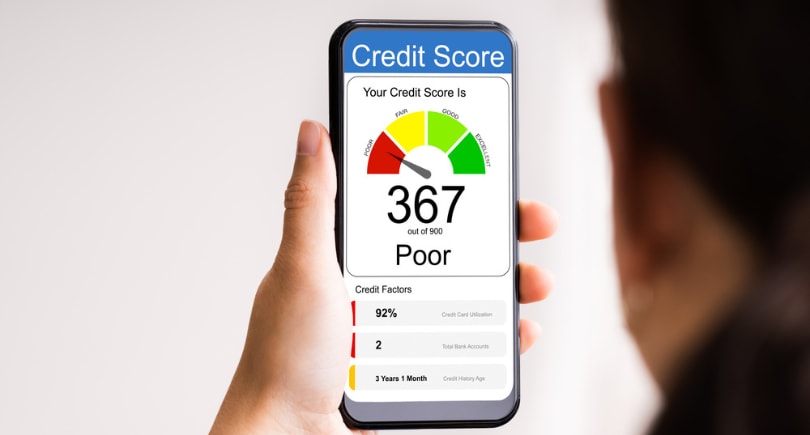

Why you should trust CardRatings.com
At CardRatings.com we discuss the most up-to-date news and trends within the credit card space. Since we first pioneered the concept of online credit card reviews in 1998, our team of financial experts has provided comprehensive and unbiased credit card reviews for more than 175 cards, plus hundreds of additional resource articles to help educate everyday cardholders so they can feel more confident about their card choices. All our content is written and reviewed by industry experts. Though our content may occasionally contain references to products from our partners, we maintain strict editorial integrity and advertiser relationships and compensation never influences ratings, reviews or featured products. The difference between editorial content and advertising must always be clearly stated. Learn more.
Have you ever been surprised when your credit score dropped? Most likely, it’s because you made one of the five mistakes below. Most people aren’t aware of the impact some of these actions have. And what’s interesting is that it appears that the higher your score, the greater the drop when you make a mistake.
It’s a mistake to close an account
People often decide to close credit card accounts for one of a few reasons:
- The card charges an annual fee and the cardholder doesn’t want to pay it
- They think they have too many cards and they want to simplify
- Their lifestyle or budget has changed and they believe the card no longer meets their needs
- They believe closing a card will positively affect their credit score
While several of those reasons are valid considerations, that final point is not: Closing an account can actually LOWER your score. That’s because a closed account impacts your credit utilization rate and can impact your length of credit history (more on this below).
Your utilization rate is the ratio of your credit card balances to your credit limits. For instance, let’s say you have two cards and one has a zero balance and one has a $1,000 balance. If each card has a $2,000 limit, your total limit (across both cards) is $4,000. Your utilization rate is $1,000/$4,000 = .25, or 25%. Not fabulous, but not too bad. Most experts recommend keeping your utilization below 30%.
Close the account with the zero balance and your utilization rate jumps to 50% ($1,000/$2,000), so well over that recommended 30% mark. Obviously, the impact on your score will vary according to your individual circumstances, but since the utilization rate accounts for about 30% of your score, your score will probably take a negative hit.
It’s a mistake to max out your credit cards
Many consumers make the mistake of thinking that their credit limit is an invitation to spend until it’s gone. Now that you understand utilization rate, you probably now understand why maxing out your cards is a problem. Let’s look at our example from #1 again. If you max out your two cards, you’ll have a $4,000 balance with a $4,000 limit. It’s doesn’t take a math genius to quickly figure out that your utilization rate is now 100%.
Your credit score will take a hit. How much depends on a lot of factors. In 2019, FICO did a comparison of how much a score drops for multiple simulated credit profiles. Maxing out credit cards was one the “mistakes” they used in the comparison.
Results showed that, for example, the consumer with the 793 score experienced a 108-128 point drop and the score fell into the 765-685 range when maxing out their cards. The person with the 669 score saw only a 9-29 point drop and the score fell into the 640-660 range. Take a look at the full report.
It’s a mistake to make late payments
One problem with making late credit card payments is that, depending on the terms and conditions of your card, you might trigger the penalty APR and you’ll almost certainly incur a late fee. The other problem with a 30-day or more delinquency is that it can make your score drop like a rock. In the FICO study noted above, a 30-day late payment resulted in 63-83 point drop for the person with a 793 score; on the other hand, the person with the 669 score could see a drop of 24-44 points.
Now, if this late payment stretches to 90 days, the drop can exceed 100 points.
It’s a mistake to impulsively open accounts to save 15%
This happens every holiday season, doesn’t it? Whether it’s a Labor Day sale or Black Friday, you’re standing in line in your favorite department store holding a lot of merchandise, and then the cashier tempts you with a “get 15% off if you open an account today” offer. When you open a new account, this results in a hard inquiry, which affects your score. But that’s only part of the problem.
Typically, a single inquiry only knocks a few points off your score and it will likely recover quickly as long as the rest of your credit profile is in good shape. But even a few points can matter if you’re on the bubble between having good credit and excellent credit. And, of course, if you end up with late payments, matters deteriorate from there.
It’s a mistake to ignore your length of credit history
This mistake ties into the #1 mistake on this list. Sometimes when people close a card, they close one they’ve had a long time.
Let’s return to the example from Mistake #1 and say that the zero balance account you closed also happens to be your oldest credit card; it’s the one you’ve had for 10 years and your other card you’ve only had for five years. When you close that 10-year-old card, you cut your length of credit history in half. Length of credit history is another significant factor impacting your score, so shortening yours will reflect negatively on your score.
Additionally, part of the “credit history” portion that makes up your score is “account activity.” So if you have a card you don’t use often (maybe one that’s had a credit limit decrease) use it for a tiny amount every couple of months. Just keeping it active can boost your score a little.
Credit cards can impact your credit score in both good and bad ways. Make sure you understand the effect of your actions with them. After all, your credit score can influence everything from loan rates to lease agreements to your employment, so ensure you know where you stand.


